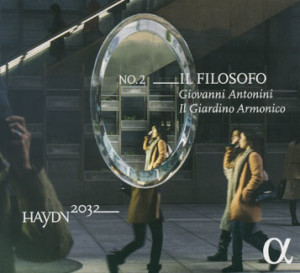This is the second release in the Basel-based Joseph Haydn Stiftung Foundation’s collaboration with Alpha in recording all of Haydn’s 107 symphonies, to be completed in 2032 in commemoration of the 300th anniversary of the composer’s birth. As in the first volume, Giovanni Antonini directs Il Giardino Armonico, the ensemble he co-founded 30 years ago, though other recordings in the series will feature him with the Basel Chamber Orchestra, another group he regularly directs. And, as with the first volume (see reviews), along with the many positive attributes there are negative aspects to the production that disallow a top recommendation.
Every release in this series will also include a work by one of Haydn’s contemporaries, and this one features Wilhelm Friedemann Bach’s Symphony in F. Antonini and the group have great fun here, from the way they rapidly shift the rhythms and tempos of the opening Vivace, resembling a Baroque overture, to the swaggering traversal of the lovely Andante, their return to clever rhythmic interplay in the third-movement Allegro, and then the remarkably light treatment of the concluding two brief Menuettos. It’s unlikely you’ll ever hear this rarity performed with more imagination or attention to detail.
Of the Haydn, I agree with my colleague David Hurwitz, who in his review of the first volume rightly insisted that the size of the ensemble, especially in the slower movements, really makes a difference. In its otherwise excellent rendering of Haydn’s Symphony No. 46, Il Giardino Armonico’s performance of the second-movement Poco adagio simply sounds limp, if not at times directionless compared with the more full-bodied accounts by Trevor Pinnock and The English Concert (DG Archiv) and especially the even larger Orchestra of the Age of Enlightenment directed by Franz Bruggen (Philips). The opening Adagio of the Symphony No. 22 and the second-movement Un poco adagio of the Symphony No. 47, while similarly in need of more orchestral body, are not nearly as sonically deficient due mostly to Antonini’s quicker pacing.
That out of the way, there’s plenty to enjoy here. The concluding Finale: Presto e scherzando of No. 46 is especially well-shaped, featuring some extremely lively dialogues between the strings and brass. Antonini’s brisk, captivating treatment of the second-movement Presto and concluding Finale: Presto of No. 22 is one thrill after another. The opening spirited Allegro and especially the third-movement Minuet Al Roverso-Trio Al Roverso of No. 47 are laced with some wonderfully witty, rhythmic ritards attesting to Haydn’s renowned sense of humor.
The sound is quite good, well-detailed, with excellent lifelike balances between the instrumental sections. Christian Moritz-Bauer’s erudite historical and contextual essay, and Antonini’s brief, fascinating notes on the originality of these works are a significant improvement over Bernhard Lassahn’s pretentious “twaddle” (as David Hurwitz described it) from Volume 1. Also included in the booklet is another series of seemingly unrelated, artsy, fragmented photos that can easily be skipped. In sum this is a worthy and often fascinating project that all fans of Haydn and late-18th-century music would do well to investigate.
































